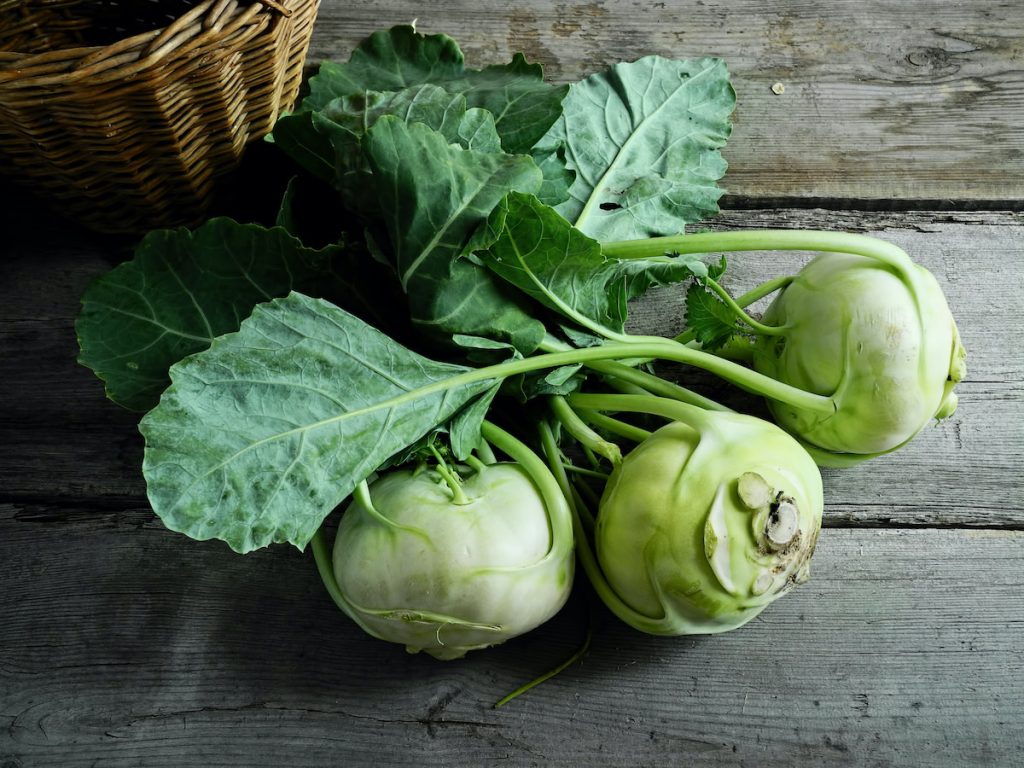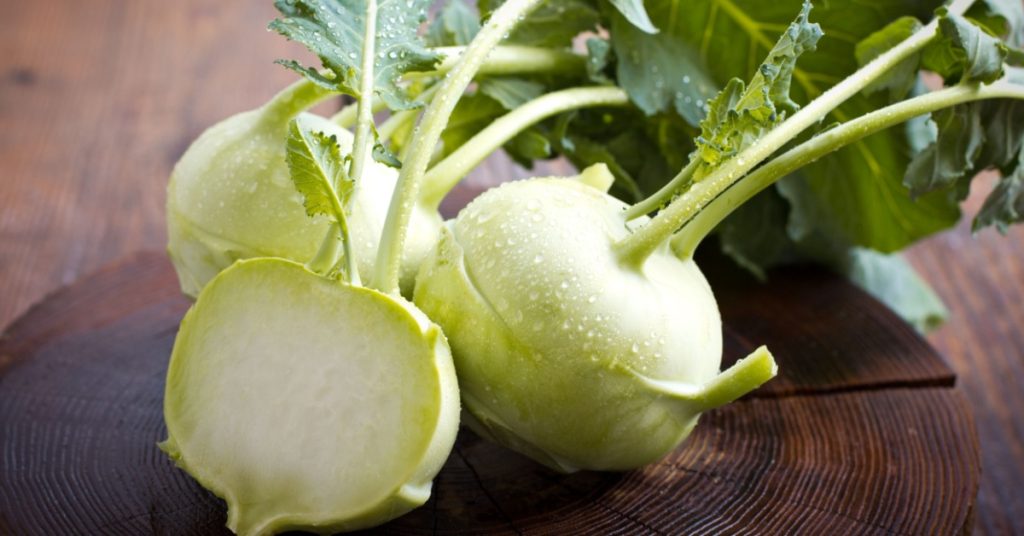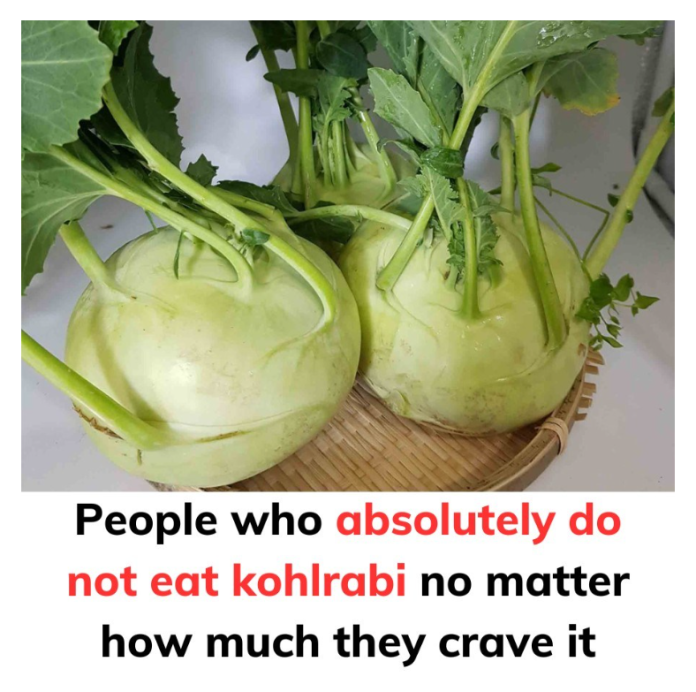Kohlrabi, a versatile and nutritious vegetable from the cabbage family, is celebrated for its impressive health benefits. Known as phiet lan, gioi lan, or gia lien in traditional medicine, kohlrabi has a sweet, slightly spicy taste and cooling properties. While it is a highly beneficial vegetable, it’s essential to understand its nutritional value, health advantages, and situations where caution is advised.
Nutritional Profile of Kohlrabi
According to the United States Department of Agriculture (USDA), 100 grams of kohlrabi contains:

- Calories: 27 kcal
- Protein: 1.7 g
- Carbohydrates: 6.2 g
- Fiber: 3.6 g
- Calcium: 24 mg
- Magnesium: 19 mg
- Phosphorus: 46 mg
- Potassium: 350 mg
- Sodium: 20 mg
- Vitamin C: 62 mg
- Beta-carotene: 22 µg
- Folate: 16 µg
This nutrient-rich profile highlights kohlrabi’s role as a low-calorie, fiber-dense food packed with essential vitamins and minerals.
Health Benefits of Kohlrabi
Boosts Immune Health
With 62 mg of vitamin C per 100 grams, kohlrabi supports the immune system by combating oxidative stress and enhancing white blood cell activity.
Promotes Digestive Health
The 3.6 grams of fiber aids digestion, prevents constipation, and supports gut health.
Supports Heart Health
Its high potassium content (350 mg) helps regulate blood pressure and maintain a healthy heart by balancing electrolyte levels.
Rich in Antioxidants
Beta-carotene and vitamin C in kohlrabi neutralize free radicals, reducing inflammation and lowering the risk of chronic diseases.
Aids in Weight Management
Low in calories but high in fiber, kohlrabi promotes satiety, making it a great addition to weight-loss diets.
Bone Health
Minerals like calcium, magnesium, and phosphorus strengthen bones and support overall skeletal health.
Detoxification and Diuretic Properties
Traditional medicine highlights kohlrabi’s ability to detoxify and act as a natural diuretic, promoting kidney health and flushing toxins from the body.
Who Should Limit or Avoid Kohlrabi?
Despite its benefits, certain groups should consume kohlrabi cautiously to avoid potential health issues:

1. People with Stomach Pain or Indigestion
Raw kohlrabi, though nutrient-rich, can be difficult to digest for individuals with sensitive stomachs or digestive issues.
Children and those prone to stomach discomfort should avoid raw kohlrabi salads or direct consumption.
2. People with Thyroid Conditions
Like other cruciferous vegetables, kohlrabi contains goitrogens, plant compounds that can interfere with thyroid function and potentially cause thyroid swelling.
Individuals with thyroid dysfunction should limit their intake of kohlrabi or consult a healthcare provider before adding it to their diet.
3. Overconsumption Risks
Traditional medicine warns that excessive consumption of kohlrabi may lead to loss of blood and energy due to its strong detoxifying and diuretic effects.
Eating kohlrabi in moderation ensures that its benefits are maximized without causing imbalances in the body.
Kohlrabi in Traditional Medicine
Kohlrabi is a staple in traditional Chinese medicine, valued for its cooling properties and various therapeutic uses, including:
- Treating cloudy urine and bloody stools.
- Reducing phlegm accumulation and alleviating respiratory issues.
- Detoxifying the body and combating inflammation.
- Supporting the stomach and spleen while addressing excess internal heat.
How to Safely Enjoy Kohlrabi
To maximize the health benefits of kohlrabi while minimizing risks:

- Cook It Lightly: Steaming, roasting, or stir-frying makes kohlrabi easier to digest and reduces goitrogen content.
- Pair with Healthy Fats: Adding a small amount of healthy fat, like olive oil, enhances the absorption of fat-soluble nutrients like beta-carotene.
- Eat in Moderation: Incorporate kohlrabi into your meals a few times a week rather than daily to avoid overloading on its diuretic effects.
- Combine with a Balanced Diet: A varied diet ensures you get all necessary nutrients while preventing reliance on any single food source.
Final Thoughts
Kohlrabi is a nutrient-dense vegetable that offers numerous health benefits, from boosting immunity to improving digestion and supporting heart health. However, it’s important to consume it in moderation and be mindful of specific health conditions, such as thyroid issues or digestive sensitivity. By preparing it thoughtfully and incorporating it into a balanced diet, you can enjoy the unique flavors and remarkable health benefits of this versatile vegetable.

















